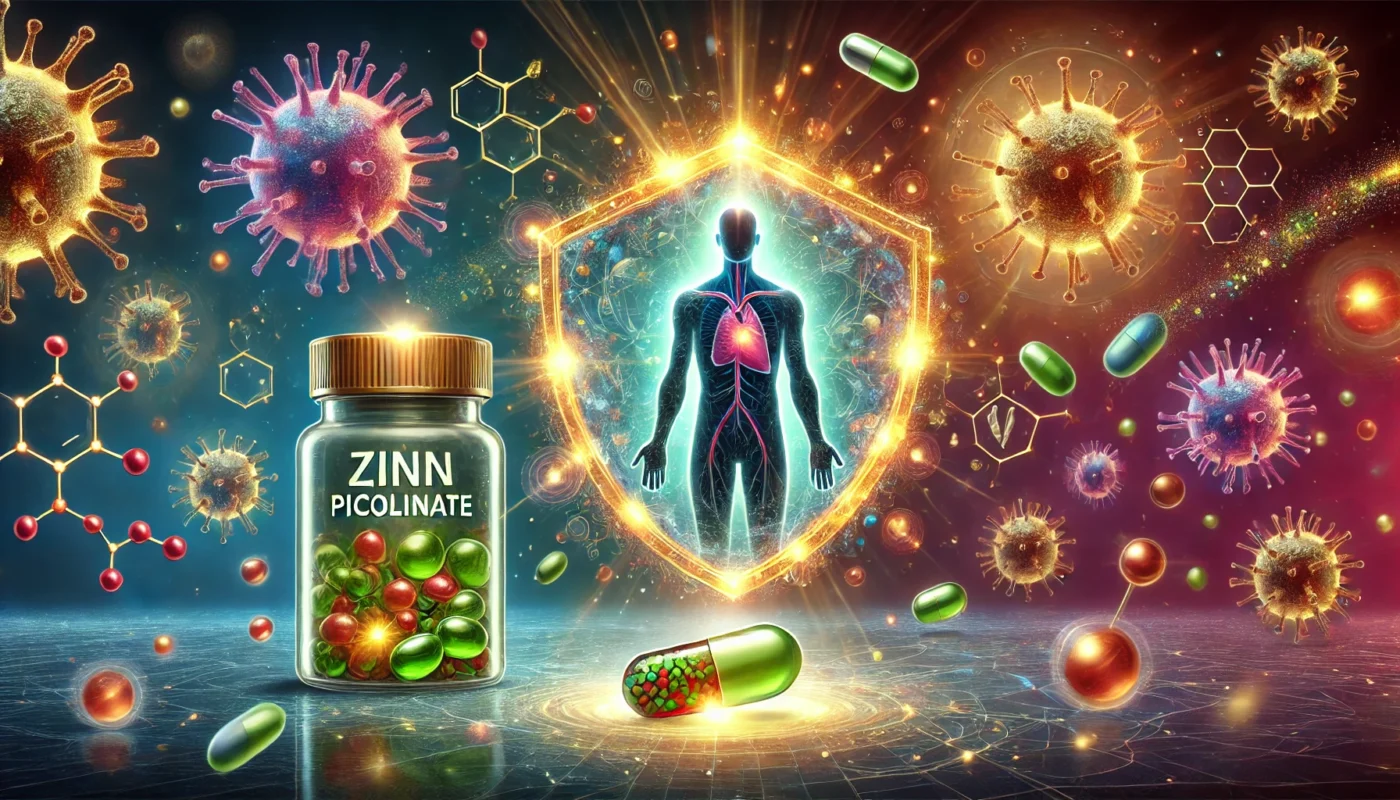Viruses are a persistent threat to global health, as evidenced by the ongoing challenges posed by seasonal influenza, respiratory syncytial virus (RSV), and pandemics like COVID-19. In this landscape, a strong immune system is essential for combating viral infections and reducing their severity. Among the nutrients known to enhance immune function, zinc stands out for its antiviral properties. Zinc picolinate, a highly absorbable form of zinc, offers a potent means of fortifying the body’s defenses against viral infections.
This article explores the science behind zinc picolinate’s role in antiviral immunity, presenting evidence from clinical studies and detailing its mechanisms of action to demonstrate how it supports a robust immune response.
You May Also Like:
Zinc Picolinate and Teen Hormonal Health: Supporting Balanced Growth
Zinc Picolinate and Allergies: Can It Provide Relief?
The Connection Between Zinc Picolinate and Antiviral Immunity: What Science Reveals is an original (HSLHealing) article.
Understanding the Immune System’s Role in Fighting Viruses
When the body encounters a viral pathogen, the immune system activates two main lines of defense:
- Innate Immunity: The first line of defense, which includes physical barriers, immune cells like macrophages and natural killer (NK) cells, and the release of antiviral interferons.
- Adaptive Immunity: A more targeted response involving T-cells, which destroy infected cells, and B-cells, which produce antibodies to neutralize the virus.
Both innate and adaptive immunity require essential nutrients like zinc to function optimally. Zinc deficiency can impair immune responses, leaving the body more vulnerable to viral infections.

Zinc and Antiviral Immunity: Why It Matters
Zinc is a trace mineral critical for numerous immune processes, many of which are directly involved in combating viral infections. Its antiviral effects are mediated through several mechanisms:
- Inhibiting Viral Replication: Zinc interferes with the replication of various viruses, including coronaviruses and rhinoviruses.
- Enhancing Immune Cell Function: Zinc boosts the activity of T-cells, B-cells, and NK cells, which are essential for clearing viral infections.
- Regulating Inflammation: Zinc prevents excessive inflammation, which can damage tissues and worsen viral illnesses.
- Antioxidant Protection: Zinc neutralizes free radicals, reducing oxidative stress that can weaken immune defenses.
What Is Zinc Picolinate?
Zinc picolinate is a chelated form of zinc, in which zinc is bound to picolinic acid. This form enhances zinc absorption in the gastrointestinal tract, making it one of the most bioavailable forms of zinc supplementation. For individuals seeking to strengthen their immunity against viruses, zinc picolinate ensures that the body receives adequate zinc levels for optimal immune function.

How Zinc Picolinate Supports Antiviral Immunity
1. Inhibiting Viral Replication
Zinc disrupts the replication cycle of viruses by interfering with the activity of viral RNA-dependent RNA polymerase (RdRp), an enzyme required for viral genome synthesis.
- Study Insight: Research in PLOS Pathogens demonstrated that zinc inhibited the replication of coronaviruses by blocking RdRp activity, reducing viral load in infected cells.
2. Enhancing T-Cell Function
T-cells are essential for destroying virus-infected cells and coordinating adaptive immune responses. Zinc picolinate supports T-cell development and activity.
- Clinical Evidence: A study in The American Journal of Clinical Nutrition found that zinc supplementation increased T-cell activity in elderly individuals, reducing the severity and duration of viral infections.
3. Boosting Natural Killer (NK) Cell Activity
NK cells are part of the innate immune system and play a critical role in identifying and destroying virus-infected cells. Zinc enhances the cytotoxic activity of NK cells.
- Research Finding: A study in Immunological Reviews showed that zinc supplementation improved NK cell function, enhancing the immune response against viral pathogens like influenza.

4. Reducing Inflammatory Cytokines
Excessive inflammation, often referred to as a “cytokine storm,” can worsen viral infections by damaging tissues. Zinc picolinate helps regulate the production of pro-inflammatory cytokines.
- Study Insight: Research in Nutrients demonstrated that zinc supplementation reduced levels of tumor necrosis factor-alpha (TNF-α) and interleukin-6 (IL-6) in patients with viral respiratory infections.
5. Supporting Antibody Production
B-cells, which produce antibodies, rely on zinc for proper functioning. These antibodies neutralize viruses and prevent them from infecting healthy cells.
- Clinical Finding: A study in Journal of Nutrition reported that zinc supplementation enhanced antibody production in response to vaccines, indicating improved adaptive immunity.
6. Preventing Oxidative Damage
Oxidative stress weakens immune defenses and exacerbates viral infections. Zinc picolinate acts as an antioxidant, protecting immune cells from damage.
- Research Insight: A study in Free Radical Biology and Medicine highlighted that zinc supplementation reduced oxidative stress markers in patients with viral respiratory infections, improving recovery times.

Zinc Deficiency and Increased Viral Susceptibility
Zinc deficiency is a common global issue, affecting an estimated 17% of the world’s population. Deficiency compromises immune function and increases susceptibility to viral infections.
Symptoms of Zinc Deficiency:
- Increased frequency and severity of infections
- Delayed wound healing
- Impaired sense of taste and smell
- Fatigue and reduced energy
Statistics:
- A study in The Lancet estimated that zinc deficiency contributes to over 16% of lower respiratory tract infections worldwide.
- Research in Clinical Nutrition found that zinc-deficient individuals were 50% more likely to experience severe symptoms of viral infections, including influenza and the common cold.

Dietary Sources of Zinc
While zinc picolinate supplementation is an effective way to meet daily zinc requirements, incorporating zinc-rich foods into the diet can further support immunity. Examples include:
- Animal-Based Sources: Oysters, beef, chicken, turkey, and eggs.
- Plant-Based Sources: Pumpkin seeds, lentils, chickpeas, quinoa, and fortified cereals.
However, dietary intake alone may not be sufficient during viral outbreaks or in individuals with absorption challenges, making zinc picolinate a practical solution.
Recommended Dosage and Safety
The recommended dietary allowance (RDA) for zinc is:
- Adult men: 11 mg/day
- Adult women: 8 mg/day
For antiviral support, therapeutic doses of zinc picolinate typically range from 20–40 mg/day. Excessive zinc intake (above 40 mg/day) can cause:
- Nausea
- Reduced copper absorption
- Gastrointestinal discomfort
Note: Always consult with a healthcare provider before starting supplementation to determine the appropriate dosage and ensure safety.
Integrating Zinc Picolinate into an Antiviral Health Plan
- Take as a Preventive Measure: Begin supplementation during flu season or when at risk of viral exposure.
- Pair with Other Nutrients: Combine zinc picolinate with vitamin C, vitamin D, and selenium for enhanced immune support.
- Monitor Symptoms: Track improvements in immune resilience, recovery times, and overall energy levels.
- Adopt a Healthy Lifestyle: Incorporate regular exercise, stress management, and a nutrient-rich diet to optimize immunity.

Future Research Directions
While existing studies highlight zinc picolinate’s benefits for antiviral immunity, further research could explore:
- The long-term effects of zinc supplementation on viral infection prevention.
- Synergistic effects of zinc with emerging antiviral therapies.
- Zinc’s role in reducing viral transmission in community and healthcare settings.
Conclusion: Zinc Picolinate as a Defense Against Viral Infections
Zinc picolinate offers a scientifically supported, natural solution for enhancing the body’s defenses against viral infections. By inhibiting viral replication, boosting immune cell activity, and regulating inflammation, zinc picolinate addresses the key mechanisms involved in antiviral immunity.
For individuals seeking to strengthen their immune system and reduce the risk of viral illnesses, incorporating zinc picolinate into a comprehensive health plan can provide significant benefits. As always, consult with a healthcare provider to tailor supplementation to your specific needs and ensure safe and effective use.

References
- Tumor necrosis factor-alpha (TNF-alpha) and interleukin-6 (IL-6) in B-lymphocyte function. Retrieved from: https://pubmed.ncbi.nlm.nih.gov/8990098/
- Interleukin-6 (IL-6), tumor necrosis factor-alpha (TNF-alpha) levels and IL-6, TNF-polymorphisms in children with thrombosis. Retrieved from: https://pubmed.ncbi.nlm.nih.gov/18176176/
- The Role of Zinc in Antiviral Immunity. Retrieved from: https://pmc.ncbi.nlm.nih.gov/articles/PMC6628855/
- Antibacterial and Antiviral Effects of Ag, Cu and Zn Metals, Respective Nanoparticles and Filter Materials Thereof against Coronavirus SARS-CoV-2 and Influenza A Virus. Retrieved from: https://www.mdpi.com/1999-4923/14/12/2549
- A Review of Micronutrients and the Immune System–Working in Harmony to Reduce the Risk of Infection. Retrieved from: https://pmc.ncbi.nlm.nih.gov/articles/PMC7019735/
- The Role of Zinc in Antiviral Immunity. Retrieved from: https://pubmed.ncbi.nlm.nih.gov/31305906/
Important Note: The information contained in this article is for general informational purposes only, and should not be construed as health or medical advice, nor is it intended to diagnose, prevent, treat, or cure any disease or health condition. Before embarking on any diet, fitness regimen, or program of nutritional supplementation, it is advisable to consult your healthcare professional in order to determine its safety and probable efficacy in terms of your individual state of health.
Regarding Nutritional Supplements Or Other Non-Prescription Health Products: If any nutritional supplements or other non-prescription health products are mentioned in the foregoing article, any claims or statements made about them have not been evaluated by the U.S. Food and Drug Administration, and such nutritional supplements or other health products are not intended to diagnose, treat, cure, or prevent any disease.

